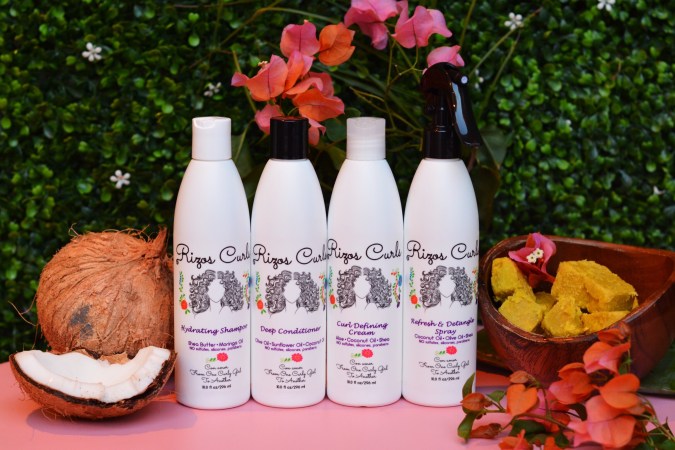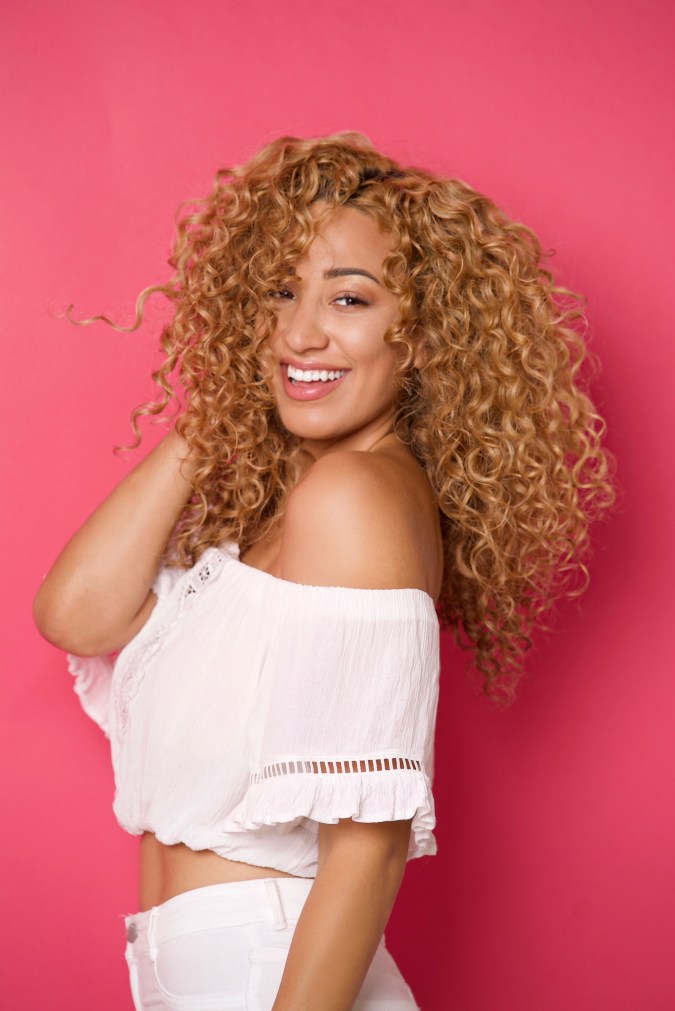With her enviable mane of bouncy, pink-hued curls, Julissa Prado serves as a walking advertisement for the effectiveness of her products. Roughly one year ago, she officially launched Rizos Curls, an all-natural product line for curly-textured hair. In that short span of time, Prado has amassed 52k+ followers on Instagram, received up to a thousand orders per month, and quit her job to pursue her business full time. But though it might look like overnight success from the outside, her growing business is the result of many years of hard work and hard-earned lessons.
As Prado tells it, she couldn’t have reached this point without the help and support of her family and her larger Latino community, who served as the inspiration for her brand. “I always thought when I made Rizos Curls that I’d make something that would work perfectly for textures as diverse as those of my family’s. In the Latino community we have so many kinds of hair textures – wavy, curly ringlets, coily textures. I have tías that fall under all of those categories. I wanted to make something that allowed us to fall in love with our natural hair,” she explains.

For Prado, Rizos Curls has been a family affair – from consulting with her brother on her business plan, to running her fledgling company out of her parents’ and uncle’s houses, to learning key lessons about how to budget & save from watching her own father run his restaurant business.

Below, she explains how her upbringing helped her develop her entrepreneurial spirit and the skills to build a DIY business.
Julissa’s responses have been lightly edited and condensed for clarity.
Your company is directly inspired by the Latino community – can you talk about how the idea came about?
I grew up in very predominantly Latino communities and neighborhoods [in Los Angeles]. I have a huge family, and when we were very young we all lived in one apartment building. Almost every unit was a different family member, so that can give you an idea of the culture and the environment that I grew up in. Growing up, I always saw how so much of my community had textured hair – they had wavy, curly, coily hair, a variety of textures. But they went to great lengths to straighten it, and not embrace it. There was a lot of self-hate around their hair. There was always this notion of ‘your hair is not done until it’s not curly.’
I remember the exact moment where I realized “Oh no, I can’t do this my whole life.” I was going to a quinceañera and my older cousins straightened my hair. Back then, in the hood, we didn’t have flat irons yet, so what they did was put my head over an ironing board and use a clothes iron. My hair was burning! I remember being over that ironing board and thinking “We’ve got to do better than this, we’ve got to figure out a way to feel good about our natural hair.”

So that’s where the idea first started. Even at a young age, I was aware that so many of my insecurities were connected to my inability to embrace my natural hair and myself in my natural state. Once I learned to love my hair it allowed me to love myself, and I wanted to create that feeling in my community. Rizos Curls is not just about the products. We’re a trifecta of the Three Cs: curls, community & culture.
What pushed you to make the leap and turn this interest into a career?
I’m very close to my [older] brother, and he’s the one who helps me a lot with Rizos. We’re very opposite. I’ve always led with my heart and emotion, and he’s ruled by logic. So when I decided I really wanted to go forward with this Rizos idea, I went to my brother with my business plan. I was still pretty young, around 15, and I presented the whole plan to him. He did all this market research – which years later, in business school, I learned is very important when you’re starting something new. Understanding your market, understanding the size of the demographic you’re targeting. He did that research on his own and was blown away. He couldn’t believe a product like Rizos Curls didn’t exist already.
Once I learned to love my hair it allowed me to love myself, and I wanted to create that feeling in my community.
Time passed, I went to college and grad school, and everything I learned, all the business acumen I acquired, all reaffirmed that I had to take this leap. Everything pointed me to, “You’re lucky no one’s jumped on this opportunity yet.” But it took me four years to figure out my product formulas, and I beat myself up a lot for taking so long. I was juggling it with getting a masters, working a full-time job, and maybe I just needed to trust the process. There were many times in that four year process of testing formulas that I didn’t get the results I wanted, and felt like giving up.
But what pushed me forward were the amount of interactions I had with curly girls. I’d meet them in the bathroom, in the elevator, in dorm rooms. And they’d tell me “I love your hair.” Back then I‘d make my own concoctions at home and use my own products in my hair. And they’d ask me “How do you get your hair like that?” I made so many friends like that, because I’d say “Ok, what dorm do you live in? I’ll come over and do your hair.” I’d do their hair, teach them my process, and they’d start wearing their hair naturally.

I forgot how many interactions I had like that until I finally launched Rizos, and all of them started commenting in support. My RA, people from my student association, they all messaged me. No matter how busy I was, that was one thing that stayed consistent – I always loved teaching people how to do their hair, that’s where my heart is.
You’ve attributed some of your success to the support you get from your family. Can you share some of the ways they’ve supported your business?
People always ask me where my entrepreneurial spirit comes from. And talking to non-brown folks, when they find out that I went to business school, and that I worked for the largest food company in the world, they expect my business background to come from being around business execs. But it’s completely the opposite. My entrepreneurial spirit one million percent came from growing up in my community. Back in Mid City when I was growing up, I’d wake up every morning to a man shouting “Pan! Elotes!” He’d come around every morning in his truck at 8 am and sell bread and tortillas from his car. I’d see my people hustling!
I remember from a very young age being the little accountant at the house.
I grew up seeing one of my neighbors selling pupusas from her house, people would take orders, and then later she got a cart, and then later she made a little shop on the corner. That’s growth! It was crazy to me growing up and seeing so many examples of people who had very little and were able to make something out of nothing. That was what always inspired me, and I always knew my people, we are so entrepreneurial. I think that because of stereotypes attached to our culture, people don’t connect the word “entrepreneur” with Latinos. So much of society doesn’t connect the word CEO with labor workers or people who are starting their own small businesses. But these are all examples of entrepreneurs who are creating their own businesses, hiring employees, and thriving.
Is managing finances something you learned from family growing up? Or did you have to figure it out on your own?
My family were great examples for me. My dad literally crawled through a sewer to get to this country, he had $10 in his pocket. He started off picking oranges in the fields, worked up to being a dishwasher, and now he owns his own restaurant. And that was his dream, owning his own restaurant was him reaching his highest goal. But back then, he didn’t know anything about business, he didn’t know English. So when I was 12 or 13 years-old he took care of the food and the back of house stuff and I did pretty much all the front-end stuff, like managing and payroll. I did everything that required English.
I remember from a very young age being the little accountant at the house. Bills would come, and I’d help my mom because she couldn’t really spell in English. So I’d be 10 year old, helping write checks. Even with my dad’s business, we all pitched in.

Growing up I saw so many examples of these incredibly mature, professional Latino kids – that’s how we raise our children in our culture, and I think not enough people recognize that. I’ll be in line at the bank and I’ll see a little 10 year-old girl with her mom, and her mom doesn’t speak English so her daughter is translating for her, she’s having a business conversation, she’s helping her mom write checks. And that’s so normal in our communities. In many ways our upbringing sets us up to have a lot of the skills we need to be entrepreneurs.
In general, our culture – we’re big savers and I learned that as well. There is a strong ethic of working hard and saving. But [my parents’ generation] kept their money under their mattress. I remember when my dad was starting the restaurant, he literally saved enough money to buy it. Even back then I remember thinking “Can’t you go to the bank and get a loan?” Today, I think “Wow, do you know you could have used that money as a downpayment and gotten a loan to afford something much bigger?” But he didn’t know what banking and financial resources were available to him! My parents were immigrants, and even though they’re citizens now, they were too scared to take out a loan.
I think our generation feels a lot more empowered. I think to myself “I have a place here in this country, I am going to take advantage of the resources available to me, and I have just as much a right to them as anyone.” So I feel like I’ve been able to take all the tools and learnings that my culture and upbringing have given me and now really capitalize on them and turn them into creating more opportunities.
What are the most important lessons you’ve learned so far when it comes to managing a business?
One of the biggest lessons I’ve learned – and it’s been the mantra for my whole life – is “fake it till you make it.” It sounds kind of funny, but there are so many spaces that I’ve gone into where I felt I didn’t belong, I didn’t look like anybody else, or I thought I didn’t know as much as the people around me. And I’d ask myself “what am I doing here?” But growing up, my mom would always tell me, “No matter where you are or how much money you have in your pocket, don’t ever let anybody make you feel like you don’t belong.” So for me, when I was intimidated going into these spaces, I’d think “My mom told me I belong here” and I’d pretend I felt that way until I did. Through that process, I realized that you don’t need to always know everything up front, or feel ashamed for what you don’t know – you can learn as you go. And I guarantee you that nobody knows all the answers. If there’s something you don’t know you can Google it, you can ask questions, you can ask for help, you don’t need to feel self-conscious. Realizing that made me stop being scared to put myself in situations where I didn’t feel fully prepared.




